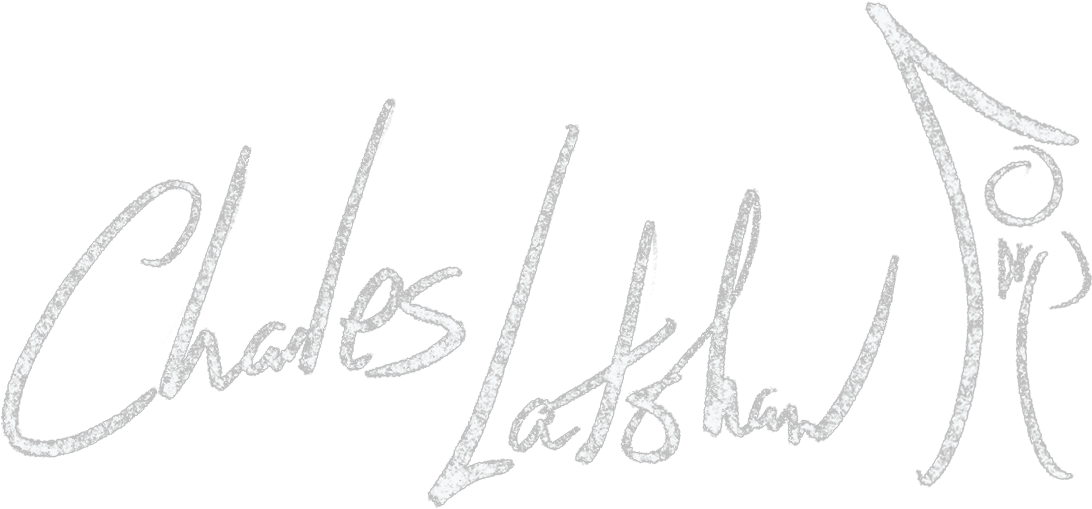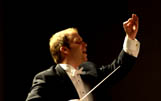By Peter Jacobi
H-T Columnist
9/26/2010
The atmosphere in the Orchestra Room on a mid-September Tuesday evening was totally relaxed. Chatting, laughter and instrumental warm-ups mingled as members of the Bloomington Symphony Orchestra gathered and prepared for their 7 to 9:15 p.m. rehearsal. Not long before starting time, their leader, their conductor, their music director, Charles Latshaw, joined them, did some chatting of his own, and — when the wall clock said 7 — called the rehearsal to order.
He and his colleagues — and colleagues, friends, they all seemed to be — got down to the business of the evening, devoting themselves to the fine points of George Gershwin’s “An American in Paris,” the concluding piece on the BSO’s season opener, to be played Saturday night at 7:30 in St. Mark’s Methodist Church.
The concert, labeled “That’s SO Last Century,” features American music written between the 1920s and ’50s: the Gershwin, Samuel Barber’s First Essay for Orchestra, Morton Gould’s World War II rouser, “American Salute,” and Randall Thompson’s “Frostiana,” a musical setting of seven poems by Robert Frost. The Unitarian Universalist Chorus, led by Susan Swaney, joins the BSO for the last named.
I sat in for about an hour of the rehearsal, a period of starts and stops, tries and retries, discussion and exploration. Here was a conductor who obviously cared about what he was doing and cared for his musicians. He not only cared but knew the music and how to direct his flock — the individuals therein, the instrumental groupings, and the whole of the ensemble — toward a clearer grasp of details and comprehension of style.
The rehearsal began with the last five measures of Gershwin’s score, then moved forward by going backward. Lesson offered and learned, the genial Latshaw responded with “Peachy” or “Wunderbar” or “Grandioso” and shifted to seven measures from the end, then ten, and so on, ever expanding coverage. The instructions were many. They must have been clear, too, considering the swift improvement to be heard:
“Don’t crescendo until three to the end.”
“Trumpets, here’s an opportunity to play more like ‘Fanfare for the Common Man.’”
“Basses, you’re running sharp.”
“Just the violins, please. Can I get as much second violin as possible?”
“One tiny thing: a tiny bit of extra time on the A-flat.”
“Let’s do it half tempo to get the articulation and dynamic changes.”
“Violinists, sing the notes, then play them.”
“Sounds plodding. Pick up the speed a notch.”
“There’s not enough fire on the first note for what follows.”
“Horns, I owe you a thousand apologies. You were exactly right.”
“I hear some grinding wrong notes in the violins. Now, again!”
“Violas, do you feel happy about it?”
“Presto. Can this be much more sprightly, like something out of ‘The Mikado?’”
“A little more like Shostakovich, but don’t make it Russian.”
Latshaw cajoled and sang, revealing at all moments a command of material and musicians. He is someone born to be a conductor. His portfolio holds credits both sides of the Atlantic, but he expresses greatest devotion to the BSO.
“It’s my top priority and means everything to me,” he says. “They’ve become my best friends.”
The orchestra is forging into its 41st season. Percussionist Joseph Car serves as BSO’s board president. He’ll play the taxi horns in the Gershwin on Saturday. “Watching Charles rehearse the orchestra has significantly improved my skills,” he said.
Car praises his conductor as “a rehearsal tactician able to get what he wants from the group without embarrassing the players or acting high and mighty. No Toscanini rants here.”
That view is shared by others. Trombonist Donna Lafferty, who studied music at Northwestern, says, “Charles has brought us together in a way I thought impossible. He exudes such love, such warmth, and musically, he’s an inspiration who gets us to do more than we think we can. I get obsessed with the music we play. Being in the orchestra means everything to me. It’s such fun. We have a blast.”
First violinist Victoria Bedford says, “Charles’ greatest gift has been to help us find the soul of the music. He also takes part at every level, from the most menial to lofty. He joins the gang for merry-making. At the same time, he is a professional musician. The music is front and center.” Bedford came to the orchestra about 12 years ago. “I practiced hard and auditioned for first violin. The orchestra has become a special community, and I’m learning so much from a wonderful young conductor.”
Clarinetist Carl Weinberg has been engaged with clarinet and saxophone since his student days in Oak Park, Ill., and after arriving in Bloomington in 2004, he “had a kind of epiphany about how important music was to me.” When he heard of an opening for clarinet in the BSO, he “jumped at the chance and managed to land in first chair.” What followed “has been amazing, a bit like a dream. Charles does a fantastic job, knows how to motivate the members without browbeating them, and never wastes one minute of rehearsal time.”
Violinist Jessica Baxter, with IU degrees in music and arts administration, says the BSO “has become such a huge part of my life, like a second family. I’ve grown as a musician but also as a person. Everyone is so different — different ages, different backgrounds. And we each bring our unique perspective and experiences to the ensemble. Charles has really brought the BSO to a new level of musicianship. He challenges us through repertoire, new ways of thinking, and through his expectations. He has definitely raised the bar.”
Adds Baxter: “The BSO has got a lot of heart. There are so many great orchestras to compete with in the area and yet, we’ve found a niche for ourselves. We make music accessible for the player and the listener, without sacrificing quality. I feel very proud.”
On Saturday, look for musicians Car, Lafferty, Bedford, Weinberg, Baxter and close to 70 colleagues. They’ll have musical things to tell you.
Read the complete article here: http://www.heraldtimesonline.com/stories/2010/09/26/scene.qp-4905514.sto

